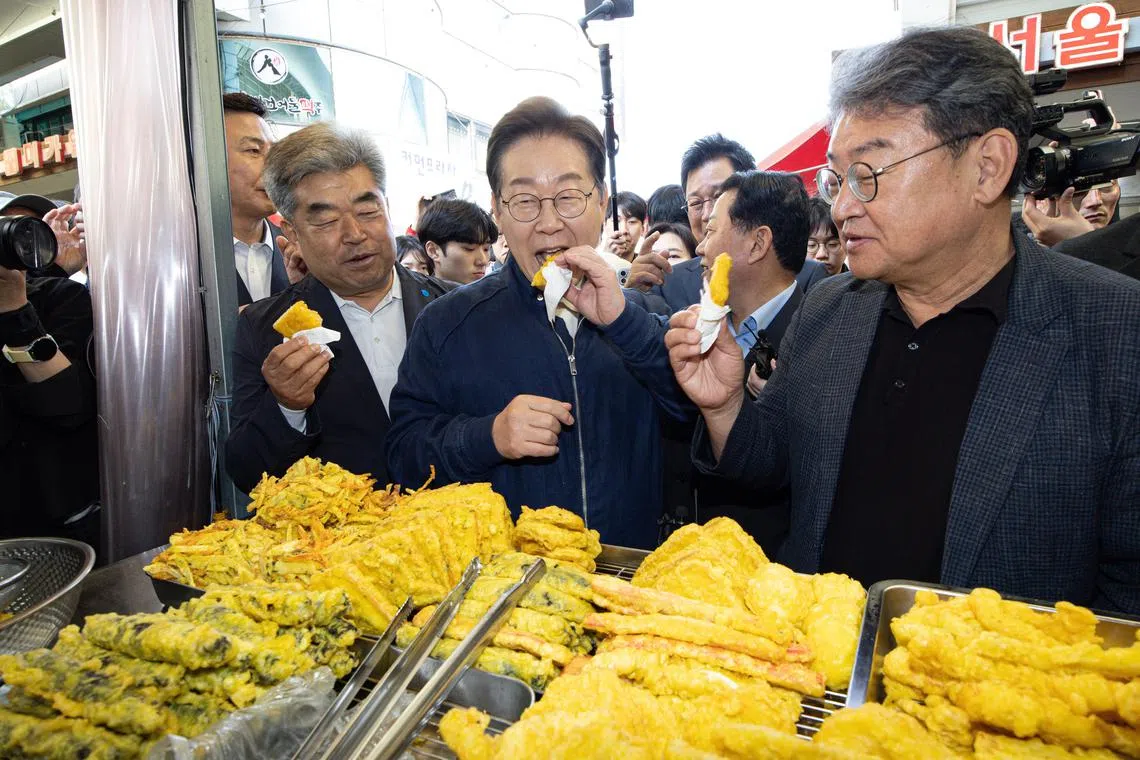South Korea’s embattled Lee Jae-myung remains front runner in leadership race
Sign up now: Get insights on Asia's fast-moving developments

Democratic Party candidate Lee Jae-myung (centre) most likely continues to hold the upper hand in a June 3 vote.
PHOTO: EPA-EFE
SEOUL – South Korea’s former opposition leader Lee Jae-myung still remains the front runner for now in a presidential election that will struggle to heal the political divide in a nation racked by leadership chaos in recent months.
As the dust settles on a flurry of resignations, leadership changes and court rulings this week, Lee most likely continues to hold the upper hand in a June 3 vote that will pit him against former acting president and prime minister Han Duck-soo or a rival from the ruling People Power Party (PPP).
The winner of the presidential election faces the task of restoring stability and confidence in South Korea’s democracy among the nation’s populace and its allies, while also protecting a trade-dependent economy’s interests against US President Donald Trump’s tariff campaign.
If Lee, of the Democratic Party (DP), does prove successful in finally becoming president, his tenure is unlikely to be smooth sailing despite already controlling Parliament. He continues to face an array of legal challenges and his opponents are unlikely to forget the partisan brinkmanship he employed to pressurise the PPP and eventually oust former president Yoon Suk Yeol over his short-lived martial law decree.
“Lee is still on track to win the election as many voters associate the PPP with martial law despite his legal situation, but he’ll face a mountain of challenges – a divided nation, an economic slump and trade talks, just to name a few,” said Mr Choi Byung-chun, former deputy head of the DP’s think-tank.
A Gallup Korea poll released on April 25 shows Lee with 38 per cent support among voters compared with just 6 per cent for Mr Han. The two final candidates bidding to become the ruling PPP representative in the election, former party chair Han Dong-hoon and former employment and labour minister Kim Moon-soo, garnered 8 per cent and 6 per cent each.
Mr Han Duck-soo is expected to seek to unite a campaign with the PPP’s final candidate to rally conservative voters against Lee.
A joint survey by four pollsters released on May 1 shows Lee secured 42 per cent, followed by Mr Han Duck-soo with 13 per cent, Mr Han Dong-hoon with 9 per cent and Mr Kim with 6 per cent. Asked about a showdown scenario between the former premier and the DP candidate, Mr Han’s support goes up to 31 per cent against Lee’s 46 per cent.
The latest legal woes for Lee and Mr Han’s declaration of his candidacy may already have eaten into Lee’s lead.
The biggest immediate threat to Lee’s candidacy is his sentencing after he was found guilty of violating election law during an earlier presidential campaign against Yoon in 2021. The Supreme Court on May 1 overturned an earlier acquittal ruling in the case and sent it back to the High Court for sentencing.
The original district court sentence was a suspended one-year prison sentence, which would make Lee ineligible to take public office if finalised. Korea University law professor Chang Young-soo said the High Court is likely to hand down a similar sentence.
Ineligibility would throw the race wide open since the DP does not have an obvious replacement candidate waiting in the wings.
Still, even if Lee is sentenced again before the election, he would most likely appeal against it, enabling him to stand. Should he win the election, experts are divided on whether he would have presidential immunity to stay in office. It is a point the PPP would inevitably target, especially after the barrage of impeachment motions launched by Lee’s party in recent months.
Constitutional Court secretary-general Kim Jung-won said it is “likely” that a sitting president would lose his position if handed a sentence that would have nullified his election, when he was asked about this point in Parliament in October 2024.
The DP proposed a Bill on May 2 to enable the suspension of criminal court proceedings for presidents while in office, a move characterised by the PPP as “shameless, preferential treatment” aimed at facilitating a Lee presidency.
“The broad consensus is that presidents have immunity from criminal prosecution but not from court sentencing from trials initiated before they take office,” said Hankuk University of Foreign Studies’ law school professor Lee Chang-hyun. “Still, realistically, it would be difficult for courts to deliver a sentence that is going to be that controversial.”
Another key element in the calculus of the election is the ability of the PPP to coalesce around a candidate who can unite and appeal beyond conservative voters.
Former acting president Han is not a PPP member, and his experience as a veteran technocrat, having served both conservative and progressive administrations, might help him reach beyond the party’s support base.
Mr Han seeks to enable two-term presidencies with shorter four-year durations, a move that might bring more continuity to the nation’s political leadership. That could resonate among the public, though his failure to stop Yoon’s martial law gamble and his blocking of Constitutional Court appointments ahead of Yoon’s impeachment trial may limit his ability to gain wider support beyond the PPP.
There is also the possibility that the candidate selected by the PPP on May 3 may not throw his weight behind Mr Han.
A splintered battle against Lee would face a far higher hurdle for victory, a reality that might then prompt Mr Han to reconsider his stance. Bloomberg


